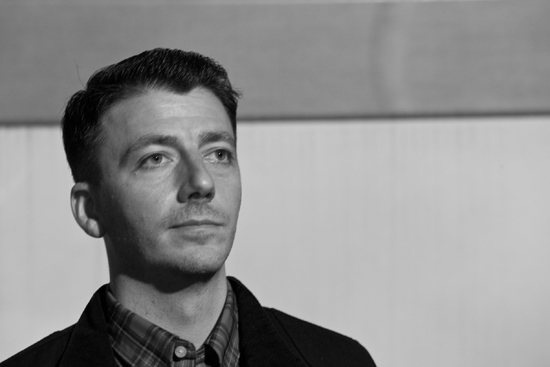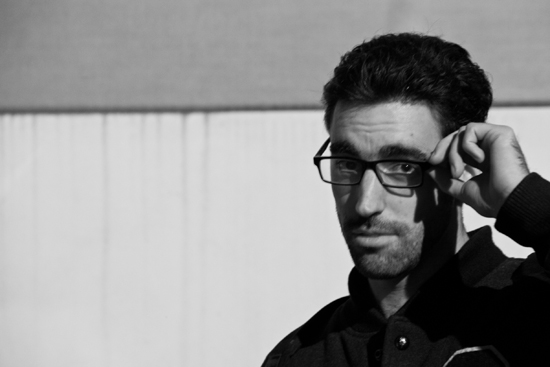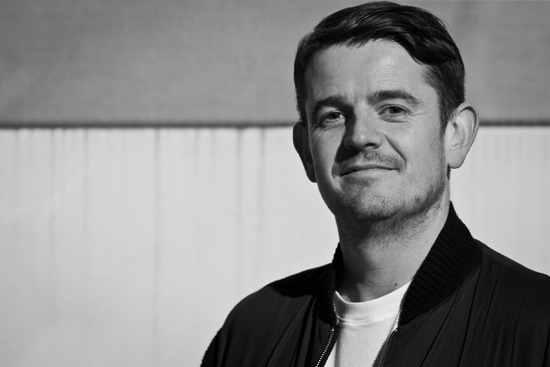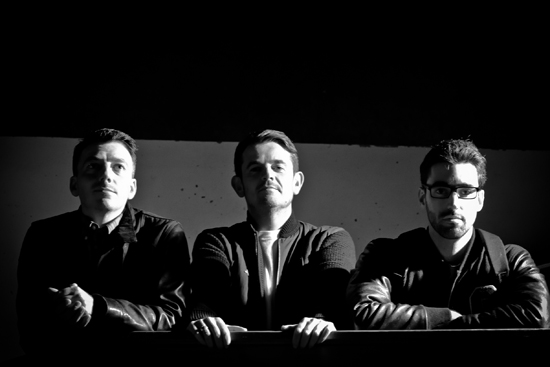Photos by Manos Fotiou
When it comes to UK dance music in 2012, there are precious few certainties to cling to. In the period of increasingly frenzied fragmentation and cross-pollination that has followed dubstep’s explosion into the mainstream, tempos and rhythmic patterns are picked up and discarded with bewildering speed, club nights rise and fall in the space of a year, and artists self-immolate in a blaze of hype after their first release, or else cling tenaciously to their profile by recalibrating their sound every six months. In this state of constant flux, where names like ‘post-dubstep’ and ‘UK bass’ – cringe-inducing catch-all terms for a vast and variegated swathe of musical activity – are the best anybody’s managed to come up with, the record label has become an ever more vital means of orientation.
After all, try to explain the sonic characteristics that unify the respective rosters of Hessle Audio, Night Slugs, Hotflush or Hyperdub’s dancefloor division and you’ll struggle. But unified under those names, a certain shared aesthetic does emerge. All of the above labels either grew out of dubstep or emerged in its wake, and all seem to have shed that formative skin in recent years: Hotflush and Hyperdub by upping the ante to attain a broader significance in the electronic music world; Hessle and Night Slugs by refining and developing their respective aesthetics until each floated free of the context that birthed it.
With Chapter One, it’s Hemlock’s turn to ‘draw a line in the sand’, as co-founder Jack Dunning, aka Untold, puts it. The label, run by Dunning and designer Andy Spencer, has been responsible for a wealth of underground dynamite since its inception in 2008: Untold’s own gobsmackingly original Gonna Work Out Fine EP; Ramadanman’s anthemic ‘Glut’; ‘Air And Lack Thereof’, the debut release from a certain James Blake. Hemlock has never quite achieved the recognition found by its peers though – perhaps because of the pair’s roving taste, which sees rugged dancefloor bombs rub up alongside downtempo fare and unusual pop hybrids (the debut release from three-piece Breton back in 2010 led to Spencer being interviewed on Huw Stephens’ Radio 1 show). If there is a common thread, Spencer insists, it’s a perpetual hunt for the new, influenced by his and Dunning’s immersion in successive waves of UK dance music culture over the past two decades.
Chapter One is Hemlock’s 20th release, and takes the form of a mix of label material put together by Dunning, alongside a series of singles featuring brand new tracks from label artists and affiliates. The mix doesn’t attempt to summarise the past four years of activity – how could it, with only an hour to play with? – but functions as a neat introduction to Hemlock, transitioning from off-kilter dubstep hybrids into heads-down techno across its length. In honour of the release, the Quietus caught up with Dunning and Spencer, along with Rohan Walder, aka Randomer – whose releases have been among the label’s recent highlights – to discuss the past, present and future of Hemlock and the current state of play in the UK scene.
It would be good to start by talking about the mix. It’s not quite a ‘greatest hits’ – there are some lesser known gems in there alongside the obvious choices. How did you go about putting together the tracklist?
Jack Dunning: It was really tricky actually. I had a rough tracklist, but then when I started throwing it together I realised, ‘Shit, we haven’t released a single DJ tool – there’s nothing that’s making my job easy here!’. In the initial draft we tried getting some Breton stuff in there, some of the downtempo stuff Fantastic Mr Fox was doing – but it was too much. I had to edit it back far more. I’m sure people will say, ‘Why isn’t [Pangaea’s] ‘Hex’ in there, why isn’t ‘Glut’ in there?’ In the end it was almost like having a keyword to give it a narrative – so there’s this dark tribal thing running through most of it.
It’s roughly chronologically ordered, too.
JD: Well, that was mainly to do with tempo. The other thing we were scratching our heads about is that it starts quickly and then gets slower – not the natural thing for a DJ set. But it made sense to finish up with where we’re at now, and start where we started.
Looking at the mix, or generally at the label’s back catalogue, would you say there’s a unified sound or ethos there?
JD: There was never meant to be one. When we started the label, Andy and I were going to DMZ – I guess that was around the night when it started at 3rd Base and moved upstairs to Mass. So we were fully in that – hearing what Loefah was doing, the tribal dark stuff that Mala was doing, being completely blown away. I think at that point there was definitely a halfstep explosion, there was room for exploration within that without having to be a purist halfstep/dubstep label. Andy and I were both into drum & bass so we were really into what Toasty was doing then, Search And Destroy, and Quiet Storm/Caspa, funnily enough. Loads of breaks in there. So yeah – it was blatantly inspired by DMZ but the palette was… dark and breaky, maybe a bit jungly, somewhere in between.
Andy Spencer: I was trying to think the other day why we ended up going down the routes we did, and I think it’s because myself and Jack are both getting on – me more so than Jack [laughs]. But we’ve both had the luxury of, within our own lifetimes, seeing hip-hop, house, acid, hardcore, jungle, D&B, dubstep – masses and masses of new stuff coming out constantly. And being right into that from the start, you get a bit of a craving for the new, and there’s an excitement around hearing something that’s completely alien and against the grain. And I think that’s driven a lot of [label decisions]: even within this tiny niche scene, we’re always looking for the thing that’s standing out – the sound that pricks your ears up. So I think that’s why we’ve ended up with the slightly eclectic selection we have.

Untold, aka Jack Dunning
It’s interesting, you both having lived through all this dance music history-in-the-making. As a younger guy I’ve come to it all retrospectively – and I think a lot of people operating in a similar area to you, the Hessle guys for example, are coming to it retrospectively. So how, to you, how does the last four years slot into all that history?
AS: Well I can’t believe I’ve had the chance to ride out another scene that’s gone huge and global – I’d pretty much given up. I was 32 and hadn’t been to a club in six or seven years…
JD: And I dragged you out…
AS: …and then I ended up with DMZ every two months and FWD on a Sunday! It was phenomenal. Having been to jungle clubs, Metalheadz in the early days, all of that lot, there was a massive community there which was amazing. The DJs were always around, there wasn’t an exclusivity thing going on. And to then have dubstep blow up and to be a part of it – I don’t think we ever saw that happening.
JD: Scene-wise, in the UK at least I don’t think there’s anything as significant [for me] as when dubstep blew up. With everything else I’ve been kind of grasping at that solidarity, that platform, that small bunch of producers. I guess now, with Facebook and social media usage and dependence, everything’s documented before it’s even there. But in those early days [of dubstep] it did feel as though the people in the club were the only people hearing this stuff. That had a magic to it.
Rohan Walder: I remember hearing it all on dubplate.net. That’s how I got into dubstep – I was up at Leeds at uni at the time. I was into D&B from growing up in London, listening to pirates. I remember coming back home for a weekend, being on a bus on Archway Road, and I saw the word dubstep on a poster. I thought, ‘What the hell is that? Might as well google it,’ and it came up with dubplate.net. I didn’t DJ, there was no real radio in Leeds – so I’d just listen to clips of tracks on there. I remember hearing Toasty Boy on there and that was what really took me.
It’s weird how even 2006/7 seems like a dark age compared to how things are now.
JD: There was this online crate-digging mentality [back then]. The problem I have with syndicated content music sites is that it’s sort of fed to you. Even if you have to go to dubplate.net and download that shitty .wma and you cane it, it still becomes your track – you still dug it out and it’s become yours. Rather than [it being fed to you].
So, comparing that time to now: how do you view the change in your part of the scene? Do you think it’s been broadly positive or negative?
AS: I guess in some respects you’ve got less of a pin-sharp focus on what it is you’re doing and what kind of tracks you’re finding now. But I think we’ve had a fairly relaxed approach to the whole thing, which is just to keep signing stuff we like. And we’ve got a great relationship with our distributor who’s always said, ‘If it comes down to it and you want to do two releases a year, that’s fine – we’d rather it be what you like, rather than what you feel like you should like’. So I don’t think we’ve ever felt any pressure to put out anything just to keep our name in.
I’m curious as to what people are playing at the moment. Rohan, are you finding there’s plenty of contemporary stuff to draw on which works in your sets?
RW: To be honest, I don’t really dig that much new stuff. I’m still digging stuff from the 90s – of so many different genres, and stuff that’s really basic, and also really crunchy sounding – B’more, grime, hardcore as well. I’ve been spending loads of money on hardcore records recently – and not even playing them [laughs].
AS: You should!
JD: It’s coming through in your music though.
Do you spend a lot of time trying to get that crunchy sound in your own tracks?
RW: Yeah, I spent so long getting that technique down…

Randomer, aka Rohan Walder
I’m pretty sure there was a point in the 2000s when it tipped – people stopped trying to make their tracks sound as clean and well produced as possible, and started going back the other way.
JD: Well there’s this sort of manicured Youtube-sampling aesthetic now – where you have to have just the right amount of hipster tape noise [laughs].
Jack, what kind of music’s exciting you at the moment?
JD: You know what, about two months ago I completely switched up my DJ sets – archived every tune that I was playing regularly and went on a massive vinyl binge, a massive hunt. I guess it was kind of a sign of where I was at as a producer, as someone known for dubstep, or thereabouts, who moved into doing four-four music. I was bridging that gap a bit: I was playing at that [techno] tempo, but I would be playing some new UK stuff, some Swamp [81] stuff, some stuff from the US. And I realised, ‘Hang on, this is jumping around too much, especially in longer sets, this isn’t really making a statement, this is just like blegh! [makes vomiting noise] at people’. So I focused in, and now I’m just playing really stripped back percussive stuff. And I’m enjoying the purity I’ve found in these tracks – a lot of them are just tools, from producers and labels I’d never heard of until a few months ago. And since then, I’ve been enjoying my sets much more – there seems to be a massive reaction to this music that hasn’t got much in it at all.
What kind of thing are we talking about?
JD: European underground techno, Belgian white labels; a lot of US stuff – I guess it takes influences from Chris Liebing or the harder Berghain sound but it isn’t quite as big and spacious, it’s quite raw and repetitive – just horrible, banging drug music [laughs]. If you’ve got a long set, after an hour of playing something with only maybe two or three melodies in it, this peculiar vacuum happens in the room, and if the crowd’s with you – and, touch wood, they have been – it starts to become a real tribal thing. It reminds me of times when everyone was off on the same drugs and into some atmosphere and momentum in the room. Which is something that, when I was playing these crossover sets – it was just a bit, ‘Oh, shall we go and have a fag?’ or, ‘[apathetic] I dunno… Joy Orbison will be on in a minute’. There’s nothing wrong with that [DJing style] – I love those tunes – but I’ve really tried to focus down on my sound lately.
A lot of people are playing those ‘crossover’ sets at the moment, and the crowds do often feel like they don’t quite reach that unified energy. In the end they kind of mill, rather than dance.
JD: It’s only really Ben [UFO] and a couple of other people who can do it. But Ben just nails it, ‘cos he’s got that touch where he knows the pace of the tune in two tunes’ time – so it feels like he’s judging ten minutes ahead.
RW: That’s why I plan my sets [laughs].
JD: I used to do that, but I think that was a factor in [getting complacent], ‘cos I’d be thinking, ‘I know this track goes into this one really well, there’s a nice key match…here’s a little trick on the CDJs…’. Actually, I decided, I want to fuck up and make mistakes.
I do wonder if a lot of people at the moment are hunting for some kind of purity. To me what you’re talking about sounds quite familiar – people consciously deciding to pare down and focus on just one sound. A lot of the Bristol guys, for example, seemed to do that a year or so ago, with these dark syncopated techno hybrids.
JD: Well if I were to do my Mystic Meg, I think there’s something weird, undefined – but interesting – happening around there. There’s Blawan and Pariah, the Karenn stuff – the way they’re going so brutal and stripped back, and they’re referencing what Regis and Surgeon have been doing for years. And there’s producers like J.Tijn, who’s from Anti-Social, but he’s making really grimy techno. And what Kowton’s doing, that ‘Des Bisous’ stuff. It’s almost what early UK funky was to funky house – I think there’s a sort of grime-y element being applied to horrible druggy warehouse techno.
The strange thing is, it’d be really easy to sound negative – that there’s no focus [in the scene] right now. But there’s so much focus going around, it’s just much more individualistic. Even for our little… I think Hessle Audio, us and Hyperdub, in the early days we were sharing a lot more tracks, works in progress, but now there seems to be less of that. Maybe because everyone’s so paranoid about YouTube – if your work in progress gets played on Rinse it’s up and syndicated straight away.

Andy Spencer
With that kind of variety in the scene, how do you go about sieving for good new music?
AS: I think there’s a pressure right now to identify a tune straight out – to be the one who identifies it as something that’s going to be big. I think that’s a particular symptom of where we’re at at the minute – everyone’s feeling a huge pressure to be on everything all the time, and that content overload is getting in the way. And I guess that’s a fairly recent thing. Historically, tunes would take ages to catch on – it’d take a hell of a lot of DJs to play them, a hell of a lot of tape recorders in the rave before a tune became a big deal. So I think you’ve got to allow yourself space to come back to something and think, ‘Oh fuck, that’s actually a great tune’ – and not kick yourself for not seeing it the first time round.
JD: That’s totally how I’m feeling as well. There is something about that promo listening mentality which is similar to a YouTube or Spotify way of digesting music – it’s fingerfood. Like what I was saying before, in finding those new producers – having the pleasure of buying vinyl and having a huge stack to go through – I’d actually listen to them, and then listen to them again. It was like, ‘This feels like a weird arcane art!’ So I’m having my own personal backlash at the moment, I don’t know whether there will be a broader shift.
To go back to the mix. It’s the 20th release for the label – something of a landmark. Does this mark a new phase for the label?
JD: It feels like a line in the sand. We’ve talked about mine and Andy’s tastes – we’re both from similar musical backgrounds, but I’m going out and DJing most weeks and he isn’t. I’ve got really into this techno sound – essentially tool-based techno – and Andy hasn’t been doing that. And the music scene isn’t what it was when we started. So I think we’re gonna sit back and take a breath now. All the ambition’s there, but it’s to do bigger projects – stuff that scares us like stuff did when we first started. At the moment I guess we’re feeling a bit comfortable.
AS: Like Jack said, it’s a line in the sand, it’s not the end. It just leaves a huge question mark hanging over us…in the best possible way! That’s when it gets exciting.
For more information on Hemlock and the Chapter One compilation, click here to visit the Hemlock website.


